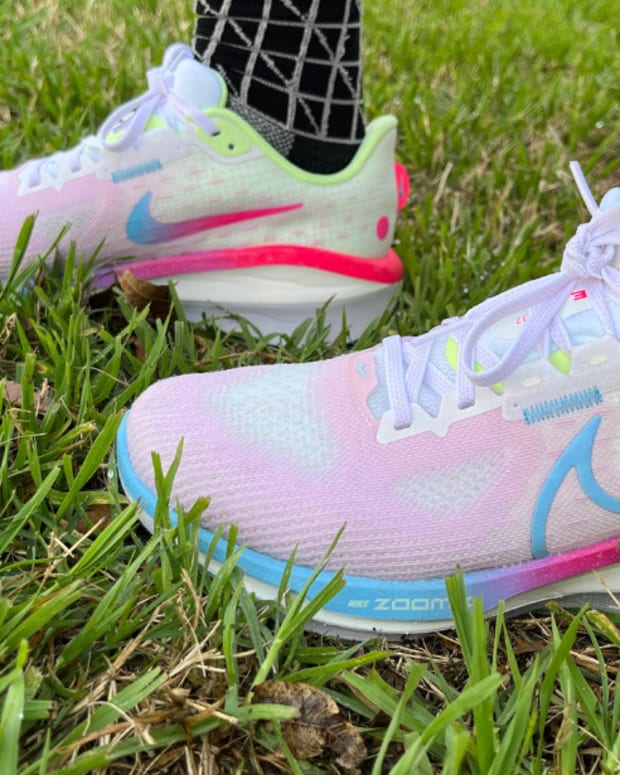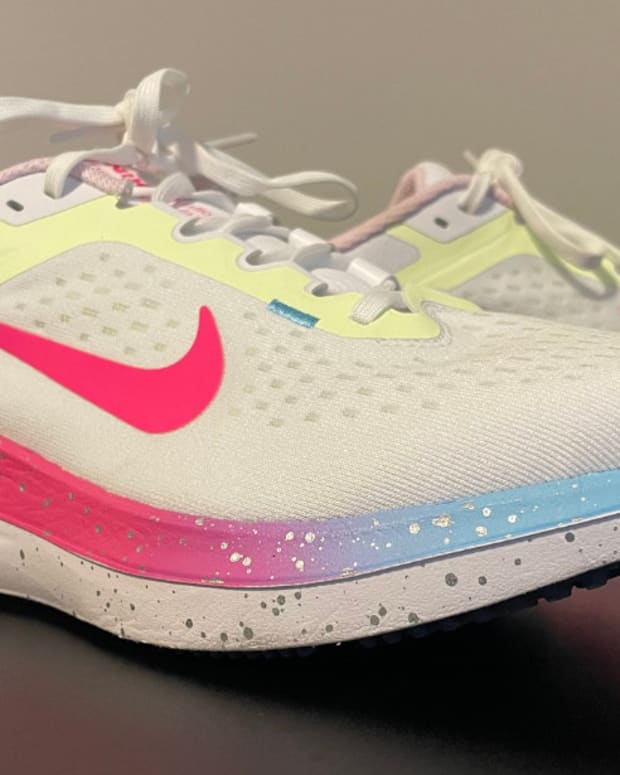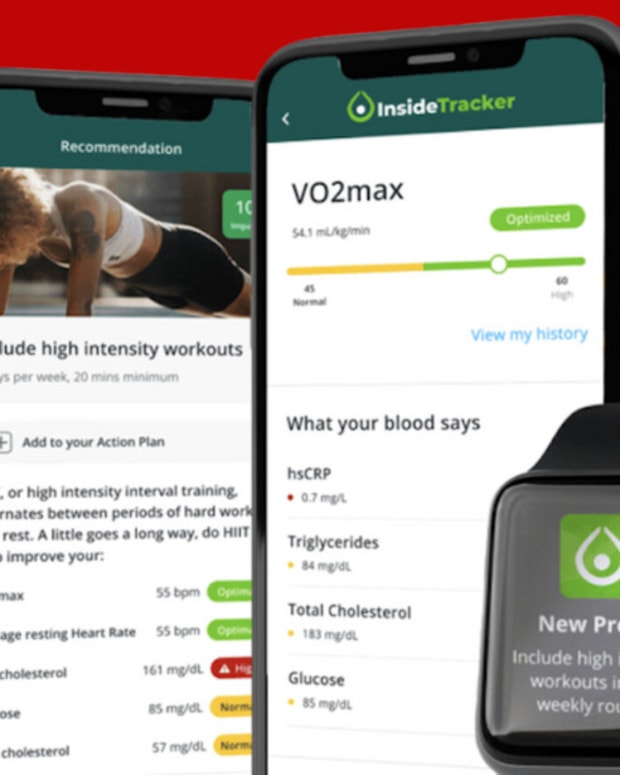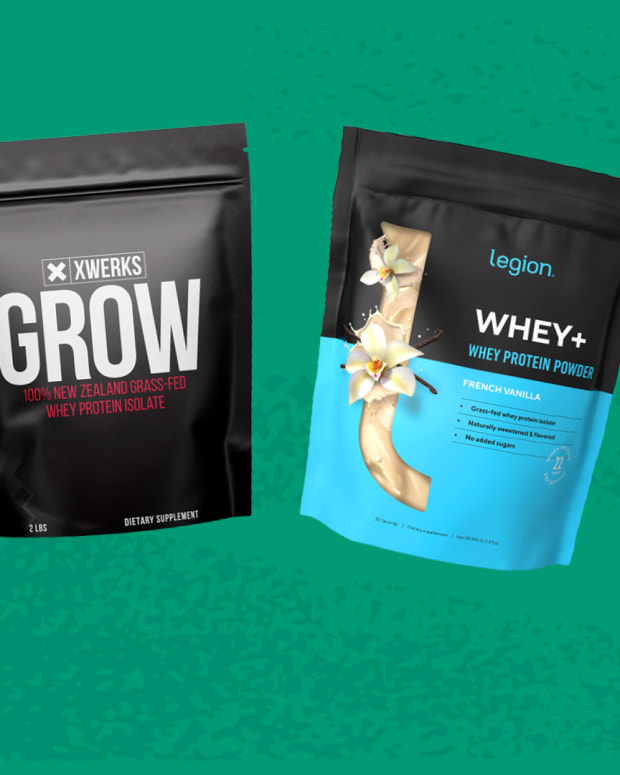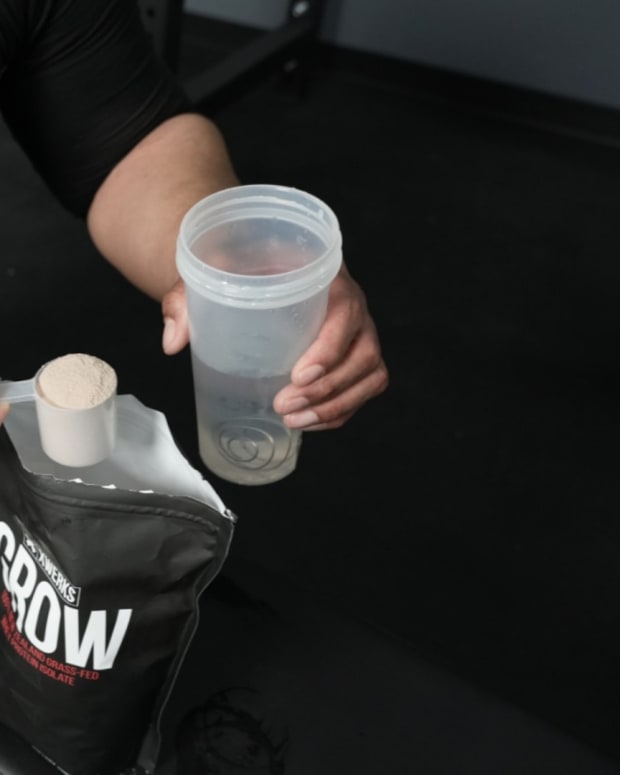The products featured in this article have been independently reviewed. When you buy something through the retail links on this page, we may earn commission at no cost to you, the reader. Sports Illustrated editorial staff are not involved in the creation of this content. Learn more here.
If there’s anything I’ve learned from weight loss programs, especially ones that emphasize nutrition, such as Noom, it’s that maintaining or achieving body goals requires commitment, strategy and a whole lot of protein. Yes, protein. The requirements struck me as quite staggering (about 0.8 grams of protein per kilogram, nutritionists suggest) as someone newer to nutrition, particularly with regard to weight loss and muscle hypertrophy. Pete Nastasi, certified sports nutritionist, says my trepidation is not an uncommon reaction. “As far as protein consumption, I think it seems a little daunting at first,” he says. The requirement seems especially challenging, Nastasi says, because when we think of high-protein foods, we often think of fattier ones (like bacon or Wagyu steak).
You may wonder how it’s possible to meet the recommendation but maintain a daily calorie deficit if you’re trying to lose weight. The good news: There’s lots of low-fat, low-carb, high-protein snacks, protein bars and protein shakes out there to help you prevent muscle loss, build lean muscle and optimize your immune system while helping to keep you feeling full.
Nastasi acknowledges though that suddenly trying to introduce peas, legumes and other plant-based high protein snacks into your diet all at once can be, well…a lot. For that reason, “maybe you start with a protein powder supplement,” he says, and then week-by-week, slowly introduce more lean proteins into your diet. That isn’t to say, however, that there’s anything wrong with enjoying higher fat protein sources from time to time, especially indulges like salmon that are packed with Omega-3s. But still, you’ll want to research the best, healthiest sources of protein to comprise the bulk of your diet for weight loss.
Lucky for you, I’ve already done the legwork. And whether you’re too busy to cook, or out and about all day, high-protein, healthy snacks are a particularly essential tool to overcome temptations that may deter your nutritional goals. Here are 13 fantastic high-protein snacks to help you meet your daily protein requirement.
This content is meant to be informative, but should not be taken as medical advice. It is not intended for use as diagnosis, prevention or treatment of health problems. Always speak with your doctor before starting any new supplement or exercise regimen.
Greek Yogurt
- Serving size: 1 container (170 grams)
- Protein per serving: 17.3 grams
- Calories per serving: 100
Greek yogurt, or nonfat strained yogurt, is typically a great low carb (6.3 grams) and protein-rich snack have between meals or after a workout. However, Nastasi suggests grabbing a nonfat and plain container (or a sugar-free brand with natural sweetener like stevia or monk fruit) if you’re craving some sweetness without the extra calories and carbs. Carbs in particular, while a good source of fuel, can be good to avoid in excess since they spike your blood sugar and increase hunger.
Peanut Butter
- Serving size: 2 tablespoons (32 grams)
- Protein per serving: 8 grams
- Calories per serving: 188
Natural peanut butter without added sugars is a solid source of protein to add to bread or an apple for additional protein intake, flavor and calories if you’re bulking for muscle gain. Peanut butter is also a balanced choice for individuals on a low carb diet (due to high fat and protein content) or vegans looking to add protein to their snacks or meals.
Chickpeas
- Serving size: 1 cup canned chickpeas (152 grams)
- Protein per serving: 10.7 grams
- Calories per serving: 210
Canned chickpeas are a type of legume that offer a great plant-based protein source while being easily prepared and packed for the road. You can drop them in the pan with whichever veggies you'd like, or simply microwave a can of them and add some oil, salt and lemon. However, chickpeas are relatively high in carbs, despite having a lot of dietary fiber, making them less ideal for those on a strict low carb diet.
Cottage Cheese
- Serving size: 100 grams of 2% milkfat cottage cheese
- Protein per serving: 11 grams
- Calories per serving: 84
Low fat, unflavored cottage cheese is an affordable, and easy to eat high-protein snack that is impressively low in carbs, with a mere 4.3 grams of carbohydrates per serving. Unfortunately, cottage cheese has almost no fiber but is full of calcium and b-12, making it a satisfying snack for vegetarians. Add some chopped up fruit, like pineapple or apples, to zhuzh up your snack with both color and flavor.
Edamame
- Serving size: 1 cup (155 grams)
- Protein per serving: 18.4 grams
- Calories per serving: 188
Edamame is a term for gathered soybeans that have yet to harden. You can buy them shelled or unshelled, but most importantly, they’re usually packaged as a snack, ready to be eaten as is or with a dash of salt. Edamame is packed with protein making them a great plant-based choice for vegans and vegetarians, and while edamame contains some carbs (13.8 grams per cup), it is also packed with fiber (8 grams per cup) to bring your net carb count (carbs minus fiber) down to about 5.8 grams per cup.
Almond Butter
- Serving size: 1 tablespoon (16 grams)
- Protein per serving: 3.4 grams
- Calories per serving: 98
Almond butter is another nut butter that’s high in protein and fiber while relatively low in carbs. Almond butter tends to have fewer carbs and saturated fat than peanut butter, making it ideal for people with heart issues or those engaging in a low carb or keto diet. Eat it straight off the spoon, or with fresh fruit or vegetables. Adding dollops of almond butter to chocolate desserts is also a way you can inject extra protein into your indulgences.
Hard-Boiled Eggs
- Serving size: 1 large egg (50 grams)
- Protein per serving: 6.3 grams
- Calories per serving: 78
Hard-boiled eggs are probably one of the first things that come to mind for a quick protein source on the go. Hard-boiled eggs require little prep, can be eaten with just your hands and are packed with 6.3 grams of protein and almost no carbs (0.6 grams) per serving (1 egg). You can also opt to forgo the yolk and snack on egg whites alone to keep the protein, but lose some of the calories, cholesterol and fat.
Hummus
- Serving size: 2 tablespoons (30 grams)
- Protein per serving: 2.4 grams
- Calories per serving: 50
One of the staples of the mediterranean diet, hummus, or mashed chickpeas, traditionally with tahini, olive oil and lemon added, is a delightful treat usually filled with healthy fats and digestible carbs (4.2 grams of carbs and 1.8 grams of fiber per serving). Hummus is a great low-calorie snack with carrots, in a salad or on bread, and offers a generous 2.4 grams of protein per serving (2 tablespoons).
Pumpkin Seeds
- Serving size: 1 cup (64 grams)
- Protein per serving: 12 grams
- Calories per serving: 285
Pumpkin seeds are a tasty snack you can quickly bring on the road. Pumpkin seeds are pretty high in carbs (34.4 grams per cup) but possess a lot of fiber (11.8 grams per cup), leaving you with about 22.6 grams of net carbs per cup serving. Pumpkin seeds are a great energy source before training; however, with the high carb and calorie count, there may be better choices for those on a low carb diet or looking to lose weight with limited time to exercise.
Beef Jerky
- Serving size: 1 ounce (28.4 grams)
- Protein per serving: 9 grams
- Calories per serving: 116
Beef jerky, my go to gas station purchase on road trips, is a great, high-protein, filling snack, especially for those on a keto or low carb diet. However, beef jerky can be incredibly high in sodium, and some brands add preservatives and sugar that can make this snack higher in carbs or unhealthy for some, depending on their diet and fitness routine. Despite that, beef jerky is an excellent protein solution in small amounts when you can't reach your kitchen. Meat lovers can also get a similar fix with deli meat roll-ups for fewer calories and sodium.
Cashews
- Serving size: 1 ounce (28 grams)
- Protein per serving: 5.2
- Calories per serving: 157
Raw, unsalted cashews deliver a good amount of protein per serving. However, with 8.6 grams of carbs and 0.9 grams of fiber, individuals on a low carb diet should consider other snack options. Notably, cashews are packed with Vitamin K, which helps to produce healthy bone tissue.
Chia Seeds
- Serving size: 1 ounce (28 grams)
- Protein per serving: 4.7 grams
- Calories per serving: 138
Like blueberries or salmon, chia seeds are a superfood packed with antioxidants believed to contain both anti-aging and anti-carcinogenic elements. In addition, they are packed with protein and have an excellent carb-to-fiber ratio that leaves you with about 2 grams of net carbs per 1-ounce serving. Chia seeds are great because you can throw them in anything to add protein and increase your snack or meal's health benefits, whether in your salad or a post-workout shake.
Canned Tuna
- Serving size: 3.5 ounces (100 grams)
- Protein per serving: 19 grams
- Calories per serving: 90
No list of excellent protein sources would be complete without at least one food for the avid pescatarian. Canned tuna is a great fish-based source packed with brain-boosting Omega-3s. Canned tuna is delicious plain, or can be spread on whole-grain or wheat crackers to add some oomph and filling dietary fiber.
Why Is It Important To Eat Protein?
Proteins are made up of essential amino acids that your body cannot supply on its own and used to help grow muscle and preserve healthy bones. Protein also helps you feel fuller for longer, since your body takes longer to break protein down. All in all, protein is a key tool your body uses to help grow and repair itself, and something every human needs to enjoy a healthier, more active life.
How Much Protein Should I Eat?
Your suggested daily protein intake can vary based on age, lifestyle and fitness goals. But, according to Harvard Medical School, the minimum daily protein intake an individual should ingest is roughly 0.8 grams of protein per kilogram of their body weight. However, this is the recommended daily minimum protein intake one should abide by to prevent sickness or malnourishment, and may not be ideal for someone on a low carb diet seeking energy alternatives or enough protein to help build muscle mass. A certified sports dietitian is a great resource to help make sure you’re meeting the steeper requirements for muscle hypertrophy.
Related Post: How Much Protein Should I Eat for Weight Loss?
High-Protein, Low-Fat Snacks
- Granola (14.3 grams of protein, 9 grams of fat per 29-gram serving)
- Quinoa (8.14 grams of protein, 3.55g of fat per 185g serving)
- Black Beans (15.2 grams of protein, .929 grams of fat per 172-gram serving)
- Soy Beans (31.3 grams of protein, 15.4 grams of fat per 172-gram serving)
- Hummus (7.78g of protein, 17.8g of fat per 100-gram serving)
High-Protein, Low-Carb Snacks
- Pistachios (5.73 grams of protein, 7.71 grams of carbs per 28.35-gram serving)
- Nut Butters (21 grams of protein, 18.8 grams of carbs per 100-gram serving)
- String Cheese (25 grams of protein, 4.17 grams of carbs per 100-gram serving)
- Hard Boiled Eggs (12.6 grams of protein, 1.12 grams of carbs per 100-gram serving)
- Hemp seeds (31.6 grams of protein, 8.67 grams of carbs per 100-gram serving)
Our Favorite Protein Sources
Swolverine Plant Protein
Swolverine produces supplements and fitness products for a variety of athletic lifestyles. Specializing in protein powder, vegans and plant-based protein fans can rejoice in their plant protein blend. Swolverine's plant-based protein powder delivers an impressive 22 grams of protein per serving by blending pea protein isolate and pumpkin seed protein. In addition to protein, the blend also offers omega-3 fatty acids via the pumpkin seed protein and a gram of inulin derived from chicory root in every serving that acts as a prebiotic or fiber source (helping with digestion).
Related Post: Best Plant Based Protein Powders of 2024
Swolverine refuses to cut corners in its products and prides itself on transparency. All Swolverine products go through unbiased third-party testing by the FDA-certified Lief and Micro Quality labs to ensure ingredient and benefit integrity in every product before being offered to consumers. Swolverine is best taken after a hard workout when your body seeks energy sources and amino acids to gain healthy muscle. Swolverine's protein products, specifically its plant-based chocolate cake and salted caramel blend, have received excellent feedback from consumers for the powder's smooth and delicious taste and easy digestion.
Transparent Labs Organic Vegan Protein
Transparent Labs offers clean fitness supplements designed to fulfill protein expectations while considering the environment, using only natural ingredients. Transparent Lab's Organic Vegan Protein blend combines the power of pea protein isolate with rice protein to deliver a complete protein—24 grams per scoop. Furthermore, the blend is free of GMOs, artificial sweeteners and preservatives, making Transparent Lab's plant-based protein blend some of the cleanest plant-based protein available. For that reason, many fitness enthusiasts tout the product's natural composition, regardless if they normally try to eat a plant-based diet.
Related Post: Save Big on Transparent Labs With Coupons, Deals and More
Transparent Labs very much lives up to its namesake, offering certificates of analysis and composition on its products via third-party testers for anyone to view on their website. The mix is best taken after a workout or if you haven't met your protein needs for the day. You also get a blend with plenty of the macronutrients you want, like protein, without those that you might prefer to pass on (only three grams of carbohydrates per serving).
XWerks Grow
The Grow protein blend by XWerks offers 100 percent grass-fed whey protein that delivers about 23 grams per serving, with only two grams in net carbs (peanut butter flavor). XWerks Grow protein blend prides itself on offering a whey protein derived from naturally raised cows in New Zealand. This means their whey is sourced from cows that are not fed any hormones, pesticides or antibiotics that could be detrimental to human health. Furthermore, XWerks has produced the Grow blend to avoid clumping and be reliably soy and gluten-free and keto-friendly. In addition, you can choose between Chocolate, Peanut Butter, Vanilla and Strawberry, giving you options so that your smoothie options are never stale.
Related Post: Is XWerks Grow Whey Protein Powder Right for You?
XWerks Grow is best taken after exercising or if you need to fulfill your daily protein quota. XWerks goes above and beyond to deliver clean-processed whey, and uses unbiased third-party testers to validate all its products. Beyond its reputable production process, reviewers of the Grow Whey protein blend from XWerks love its milkshake-like feel and taste, especially considering its incredibly low carb count (two grams per serving).
Rise Bar
Rise is a company that offers healthy high-protein snack bars that use simple ingredients to deliver a quality whole-food snack and protein source. Rise Bars offer whey or plant-based protein bars ranging from 15 to 20 grams of protein per bar, depending on your choice of flavor or ingredients. Rise Bars also use real and easy-to-understand foods such as almond butter or honey to create a reliably natural protein source with no added sugars. In addition, Rise Bar impressively uses only three to five ingredients in every bar. While less keto-friendly than some other protein sources, Rise Bars uniquely offer a straightforward, honest food solution to hunger in the moment or protein on the go.
Notably, Rise Bars include a good amount of fiber per serving (between three and five grams) and are great for both a small snack before working out and after. The whole food and simple ingredient design distinguish Rise Bar from other high-protein bars out there today, with fans of Rise Bar loving how natural their bars taste when comparing them to other fitness supplements.
Final Thoughts: Are High-Protein Snacks Right for You?
Protein is an essential staple towards a healthy life. It is a critical energy source for those on a low carb diet, and a way to develop lean muscle and a crucial organic compound our bodies use to repair themselves. Whether looking to lose weight, recover from injuries, build muscle or simply improve your overall well-being, achieving a healthy daily protein intake is something that’s beneficial regardless of your particular body composition goals. If you’re short on time, and high protein snacks aren’t enough of a lift to your diet to meet protein needs, consider a keto meal delivery service. Meal delivery services offer a great way to get high-protein, low carb meals while saving you time-consuming grocery store runs.


